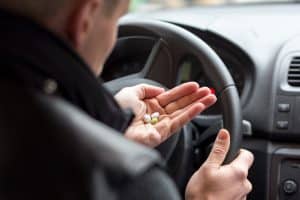 Ocean County Driving Under the Influence of Drugs Lawyer
Ocean County Driving Under the Influence of Drugs Lawyer
Have you been charged with a DUI without even having taken a sip of alcohol and are left wondering how this can happen?
In New Jersey, any driver who is suspected to be under the influence of drugs can be charged with a DUI. This means that even if you are taking a medication prescribed by your doctor, the police officer can charge you with the motor vehicle offense and you would be subject to the same penalties as though you were driving drunk or driving under the influence of illegal drugs. It seems unfair that you could be following doctor’s orders and still be charged with an offense, but it is true, and happens every day to unsuspecting people. The following law is what the police officers use to charge you with an offense.
If you or a loved one have been charge with driving under the influence of drugs, it is important to understand what is at stake, including fines, potential loss of driving privileges, and even time in jail depending on the details of the arrest and if you have been charged with DUI/DWI in the past. Do not face these potentially life altering charges alone. Call the Bronzino Law Firm today at (732) 812-3102 or fill out a contact form to schedule a free and confidential consultation. We understand the gravity that these charges carry and we are here to protect your rights and provide you with the experienced counsel that you need to navigate the legal system and mitigate the impact on your life.
DUI Lawyer Monmouth County NJ
Under N.J.S.A.39:4-50, driving under the influence, “any person who operates a motor vehicle while under the influence of intoxicating liquor, narcotic, hallucinogenic or habit-producing drug” will be charged with a DUI. This means that you can be charged just for taking a Percocet for the surgery you just had, taking medication for your depression, or even the medication prescribed for some other illness.
Prescription Medications and DUI in Brick NJ
You can be charged with a DUI simply by confirming the officer’s suspicion of DUI by admitting to taking prescription drugs. The confirmation of the prescription drugs happens after you are stopped and after he already believes you committed a motor vehicle infraction.
For example, more often than not, an officer is stopped and watching traffic go by or just following behind a car, and there is some indication that a person driving may be driving under the influence and he initiates a stop of your car. If you have ever been stopped you know that this is when the flashing lights and sirens illuminate the dark sky, and panic starts to set it for you as you start to sweat while turning on your blinker, and pull off to the side of the road hoping that the cop is stopping some other driver and not you. Much to your dismay, the officer is pulling you over and he walks up, taps on your window with his flashlight and says, “License, registration and insurance.” You show him your documents, and instead of letting you go, he starts playing a game of twenty questions.
Best Way to Avoid A Prescription Drug DUI Arrest at the Jersey Shore
The best way to avoid a prescription drug DUI arrest is to refuse to answer the officer’s question about your drug use. Do not lie to the officer. You might face a different criminal charge for telling a lie. Instead, politely tell the officer that you will not answer that question unless you have a lawyer present. No matter what the officer says after that, stick to your guns. You have the right to remain silent whether or not the officer warns you of that right. If you refuse to give the officer proof that you are using a prescription drug, the officer might decide that there is no basis for arresting you.
He asks you where you have been, where you are going, who you were with, and how much you have had to drink. Before you know it, the officer asks you if you are on drugs and, of course you say no, to which he asks if you take any prescription medications. Perhaps, unknowingly, you confirm the officer’s suspicion of DUI by answering that you take something like lithium, Percocet, Xanax, Benzos, or some other prescription. He then asks you to get out of the car and perform field sobriety tests to determine if his initial hunch of DUI is correct.
After the officer confirms the DUI, based on the driving infraction as well as the discussion with you and field sobriety tests, he arrests you and brings you back to the station. Unfortunately for you, there is nothing you can do at this point and you must comply and go back to the station with the officer.
What happens at the police station if suspected to be under the influence of narcotics?
After arriving at the station, the officer will call a Drug Recognition Expert (DRE) who is an officer with specific training designed to spot signs that that a person is under the influence of a substance other than alcohol. He performs tests and asks you many questions as he is paying careful attention to your speech, response time, and motor coordination as he wants to see if there is anything abnormal or suspicious. Another test the DRE expert administers is watching how long it takes for your pupils to dilate in certain lighting. None of the tests are an exact science like the Alcotest (tests blood alcohol content) and they are tests that we can challenge in court.
The DRE uses his findings, together with the field tests, to help prove a DUI. The officer will likely use the information that you provided him with to conform his findings. For example, if you are on Lithium and he knows this, he may say in his report that you are lethargic or drowsy and that your speech is slurred. He may inadvertently base his findings on the particular impacts that the alleged drug normally has on people, and claim that the drug impaired your ability to drive. There is little that you can do to persuade the officer otherwise and, while you do not have much control over the situation, there are certain things you can do.
When taken back to the police station you do not have to oblige all requests of the officer. While you DO have to take a breathalyzer, you do NOT have to consent to a blood sample or urine test. An officer may want to confirm that there is a drug in your bloodstream and he will ask to take a blood or urine test and he will have a laboratory check the sample for substances. You have every right to refuse to give a sample and the officer may then apply for a search warrant.
What happens to you if you are convicted of a first offense for drug-driving?
If you are convicted of driving under the influence of a substance for a first offense, you will be forced to give up your license for 7 months and pay fines from $250-$400. You will also be ordered to spend at least twelve hours at a program known as the Intoxicated Driver Resource Center (IDRC). You can also spend a maximum of 30 days in jail. In addition to the above you will have to pay $230 Intoxicated Driver Resource Center (IDRC) Fee, $100 to a Drunk Driving Fund, $100 to Alcohol Education and Rehab Fund (AERF), $1,000 per year surcharge for 3 years, and a $75 Neighborhood Services Fund fee and court costs.
Contact a Toms River DUI Attorney Today for a Free and Confidential Consultation
A DUI can have a detrimental impact on your personal and professional life. You need experienced attorneys who can fight for you, argue you case, and look for any mistakes an officer has made. Call the Bronzino Law Firm today at one of our offices conveniently located in Brick or Sea Girt, NJ, or fill out a contact form to schedule a free and confidential consultation to discuss how we can be of help (732) 812-3102.







